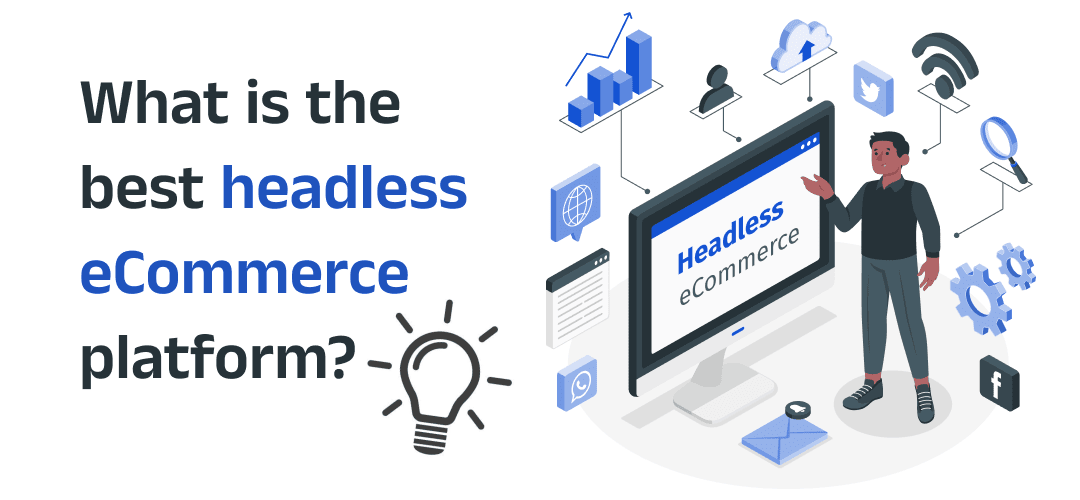
15 best headless ecommerce platforms in 2024
In the world of eCommerce, there are two main types of platforms: headless and traditional. A monolith platform uses back-end and front-end systems that are closely integrated. To personalize the front-end, developers need to change the database code. On the other hand, a headless ecommerce platform provides an API-first approach to managing a website, allowing interaction through a browser rather than a desktop application.
Essentially, headless ecommerce is a way of building an online store that doesn't rely on a traditional CMS as its backend. It is designed to help you create and manage a web shop without having to worry about how the back end works. It gives you more freedom when it comes to using the existing infrastructure and integrating it with other services without having to adopt a new system.
In this post, we'll compare 15 best headless ecommerce platforms and review them based on a number of criteria, such as their customizability, scalability, third-party integration, etc.
Top 15 headless commerce platforms comparison: pros & cons
Headless ecommerce platforms offer developers the ability to create custom shopping experiences, while merchants get an alternative to WordPress and other open source platforms. To help you find the right platform, we've created a list of the most popular headless eCommerce examples on the market today. Below you’ll find everything you need to know about choosing an eCommerce platform or development framework.
| Platform | Technology | Annual subscription | Customizability | Language support | Third-party plugins |
|---|---|---|---|---|---|
| nopCommerce | C#, ASP.NET | free/$850 for headless | Unlimited | 11 languages | 1500+ |
| BigCommerce | PHP, Python, Ruby, Java | Upon request | Limited | One (more through plugins) | 1000+ |
| Shopify Plus | Ruby on Rails, Liquid | $24,000 | Limited | 19 languages | 4000+ |
| Adobe Commerce | PHP | $22,000+ | Unlimited | 10 languages | 750+ |
| commercetools | PHP | $30,000+ | Limited | 3 languages | 25+ |
| Spryker | PHP, Symfony | Upon request | Limited | One | Dozens |
| OroCommerce | PHP, Symfony | Free/$45,000+ for custom | Unlimited | 5 languages | 100+ |
| Fabric | Java | $72,000+ | Limited | One | Dozens |
| Elastic Path | Java, Apache | $50,000 | Limited | 49 | Dozens |
| Salesforce Commerce Cloud | JavaScript | $150,000 | Limited | 6 | Hundreds |
| Swell | JavaScript | $24,000+ | Unlimited | One | 40+ |
| Snipcart | JavaScript | Upon request | Unlimited | Any supported by JS | 20+ |
| FoxyCart | PHP, HTML | $24,000+ | Limited | Yes | Yes |
| Shogun | C++ | $3000+ | Limited | One | No ready-made |
| Nacelle | JavaScript (Vue, React) | Upon request | Limited | One | No ready-made |
For more detailed information on each headless solution in this list, let’s drill down into their key differences, pros and cons.
nopCommerce
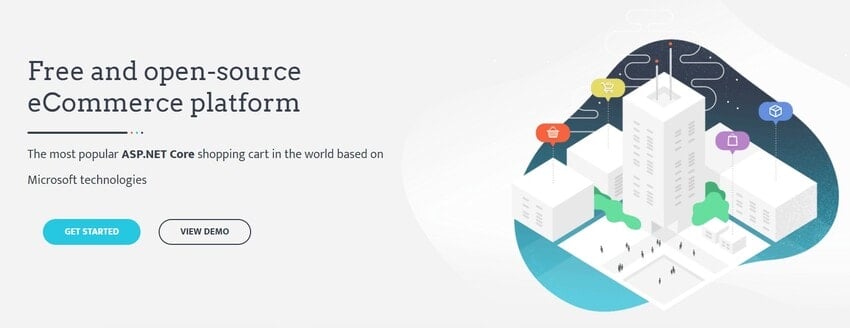
nopCommerce is an open-source eCommerce platform based on the ASP.NET framework. It means that it is secure, highly scalable, and free to download, not to mention that it offers the lowest ownership cost in the eCommerce industry. Instead of paying a monthly or yearly fee, you can truly own an online store rather than rent it on someone else’s cloud.
In addition to a configurable shopping cart and a catalog interface, nopCommerce provides robust monitoring and management features. Its headless eCommerce architecture is built by the Web API plugin. Using a REST API, you can interact with any third-party services, like CMS, PIMs, ERPs, POS, custom front-end solutions, or mobile apps. The Web API covers over 1,100 methods available in nopCommerce. This means that you can use your front-end technology (whatever it is) to create differentiated shopping experiences across infinite channels, and let the nopCommerce back-end manage all commerce functionality.
Pros:
- Rich out-of-the-box functionality (multi-store and multi-vendor support, GDPR & PCI DSS compliance)
- High customizability and scalability due to the open-source nature and a flexible plug-in architecture
- Cross-platform solution that can smoothly run on Windows, Linux, or macOS
- Integration with Microsoft SQL Server, MySQL, PostgreSQL, or RedisD for enhanced performance
- Powerful SEO and marketing features, including email & content marketing, affiliate programs, data-driven selling, etc.
- No transaction or monthly fees
- Extensive training documentation, including online courses and certification
- Active community of users, contributors and solution partners from 40+ countries
Cons:
- Rather basic CMS functionality to manage a lot of robust content pages
- Upgrading can be tricky without software development skills
BigCommerce
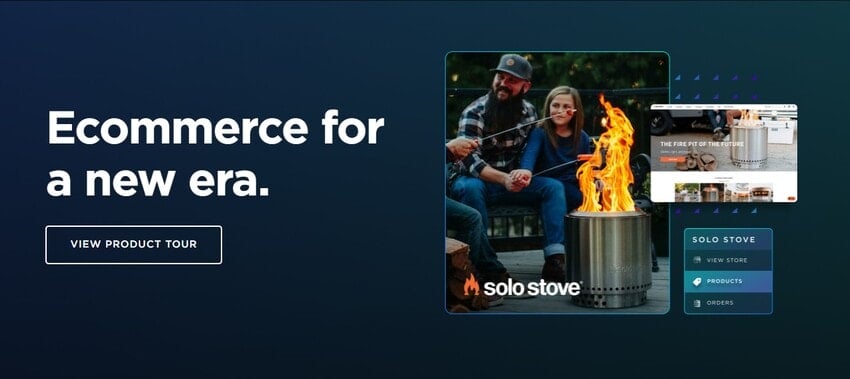
Along with Shopify, BigCommerce is a well-known eCommerce solution. The platform is jam-packed with many commerce capabilities to help businesses establish their digital presence. There is a special Enterprise edition that offers the most advanced level of functionality and focuses on large-sized companies.
Headless BigCommerce provides developers and store owners with sufficient freedom in deploying and managing their web shops. It is a good choice for those who seek flexibility and customizability in combining content and commerce features. Thanks to its extensive selection of ready-made headless commerce tools, including front-end frameworks, content management systems, and digital experience platforms, BigCommerce allows to launch online stores more quickly and modify them more easily.
Pros:
- Scalable functionality, full-featured CRM, 200+ website templates
- Omnichannel selling support and multi-store creation feature
- Unlimited number of physical or digital goods can be added into the catalog
- Advanced SEO optimization capabilities come out-of-the-box
Cons:
- No multi-language support (available only through third-party apps)
- Annual sales threshold - mandatory upgrade if the annual sales exceed the limit
- No built-in subscription or recurring payment options
Shopify Plus
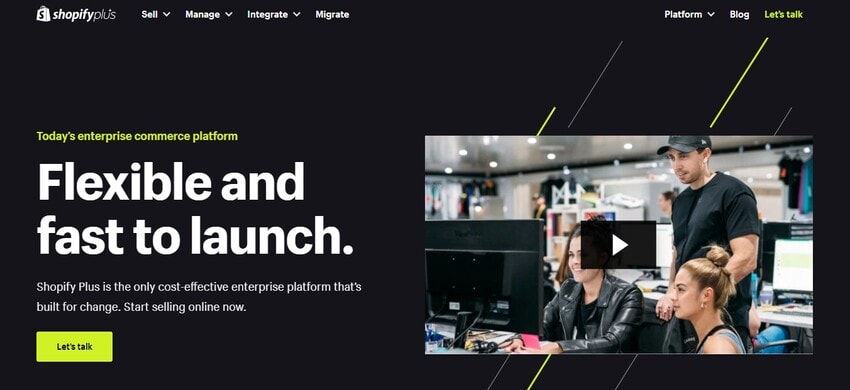
With more than 1.75 million live stores, Shopify is the top SaaS eCommerce platform. It is initially known as a ready-made option to assist small merchants in launching their own online store. Shopify Plus, on the contrary, is a full-fledged solution for medium- and large-sized businesses with limitless potential, integrated automation tools, and advanced commerce features.
Through its headless eCommerce solution, Shopify Plus allows merchants to turn any digital screen or device into a sales channel. It is used by some of the most creative businesses in the world to ensure seamless customer experiences.
Pros:
- Powerful back-end options: high-speed performance, omnichannel selling, automated business workflows, ability to scale, etc.
- GraphQL Storefront API to design fast, engaging storefronts for web & mobile
- Level 1 PCI DSS compliance to process debit and credit cards
- Front-end customization with an intuitive editor, or direct access to the code
- Built-in tools and integrations, including strong APIs and over 1,500 applications and extensions
Cons:
- A high monthly fee for running a web store + transaction fee
- No B2B selling options in the out-of-the-box functionality without third-party apps
- Unmanageable checkout
Adobe Commerce
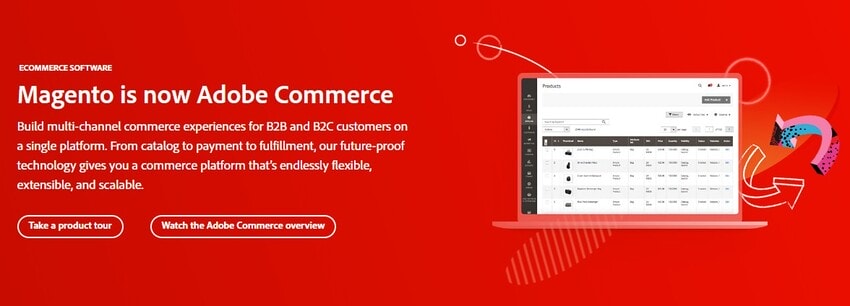
Adobe Commerce, formerly known as Magento, helps you create multi-channel commerce for any kind of business. It still comes in two versions: Magento Open Source that can be downloaded and installed without cost, and its premium version of Adobe Commerce that is appropriate for enterprise-level businesses.
Powered by a headless commerce engine, Adobe Commerce is scalable and flexible to integrate cutting-edge technologies into an online shop. Thanks to its powerful APIs, it creates seamless consumer experiences across all channels and devices in addition to providing thorough B2B-level commerce.
Pros:
- An scalable SaaS version that integrates with Adobe products like Marketo, Experience Manager, and Adobe Creative Cloud
- Unlimited flexibility: manage multiple stores, multiple language, multiple pricing and multiple currencies
- Ability to create progressive web applications using the PWA Studio
- Advanced SEO optimization capabilities & mobile-friendliness
- Strong and experienced development community
Cons:
- Long time to launch and steep learning curve
- High developer's cost, except for companies with an in-house development team
commercetools
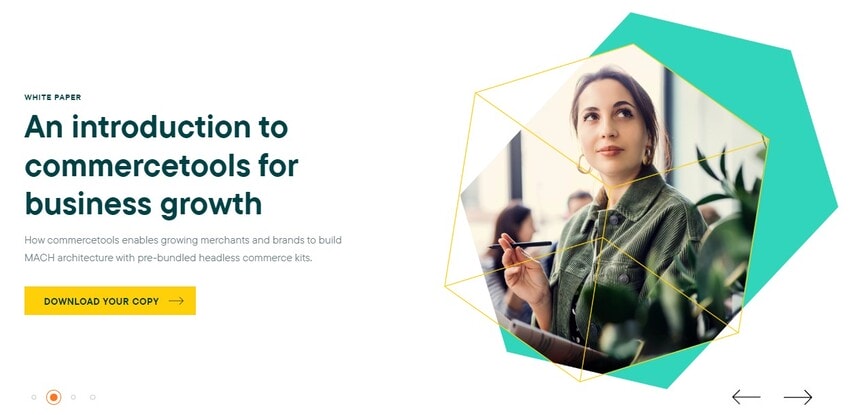
commercetools is one of the top enterprise headless commerce platforms. It is a cloud-based API-enabled solution for rapid setup and smooth integration. Using the API Model, it controls the user interface and information transfer between front-end clients and back-end ERP systems.
The commercetools back-end can be connected to all front-ends and third-party apps, giving you enough flexibility and scalability. This architecture is based on the MACH philosophy (Microservice-based, API-first, Cloud-native, and Headless). As a result, you can construct or upgrade your own infrastructure quickly and efficiently, while adapting experiences to the precise demands of your business and consumers.
Pros:
- Full API support – no need for SQL. The necessary functionality is covered via APIs
- Cloud solution, back-office hosting and maintenance not required
- The ever-expanding system, with new features always being added to
Cons:
- Pricing depends on the customer/SKU combination. Complex mapping of bespoke or contract prices to clients
- Requires a strong engineering organization, with processes like CI/CD
- No personalized end-user experience necessary to build a storefront along with the content management system elsewhere
Salesforce Commerce Cloud
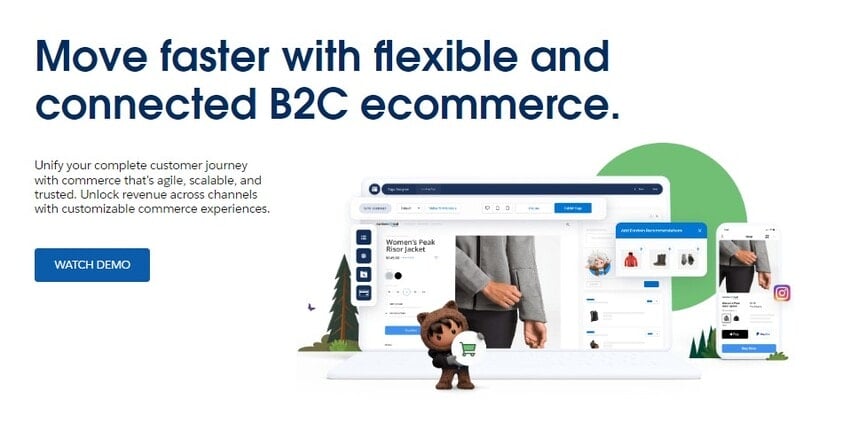
Built over Salesforce CRM, Salesforce Commerce Cloud is an agile commerce platform integrated with other products from the company’s suite. For example, eCommerce retailers may use the library of prebuilt connectors to further improve their websites and even create mobile applications. To enhance customers' shopping experiences, they are welcome to adopt API-first commerce.
To form a highly scalable, cloud-based SaaS eCommerce solution for enterprise-level businesses, Salesforce has created a headless ecommerce framework that places customers at the heart of business activity without the need to deal with a complicated infrastructure and high hosting costs. The API-focused strategy helps to create amazing front-end user interfaces while maintaining flexibility with all the back-end features.
Pros:
- The PWA kit to design mobile-first stores that are easy to adapt by digital commerce developers
- Web application firewall, security monitoring, and headless content delivery network included
- Manage tens of thousands of shops and millions of SKUs from a single back-end
- Salesforce Customer 360 is incorporated to manage customer data across marketing, sales, and service
- Fast storefront is powered by Commerce Managed Runtime
Cons:
- Salesforce Commerce Cloud is not a good option for SMEs because of its expensive pricing and technology's focus on enterprise-level firms
- Salesforce runs on its own ecosystem (different apps and services), which makes it challenging to integrate any non-suite technology
- Some people had issues with the delayed customer assistance
Spryker
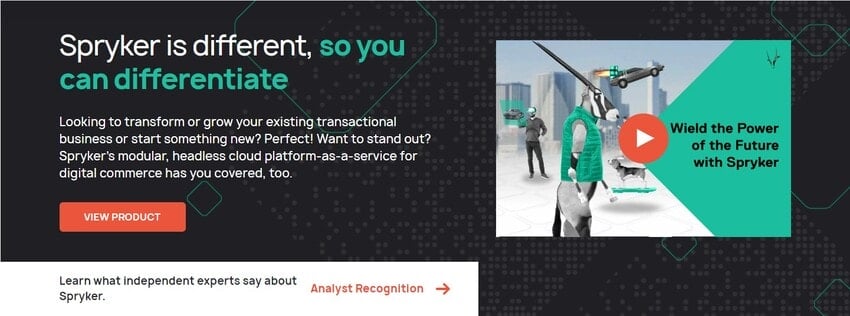
Spryker is among well-known open-source eCommerce systems and Magento alternatives that aims to provide mid- and large-sized businesses with first-rate commerce solutions. Spryker has always embraced API-first structure and a headless approach since contemporary commerce requires flexibility and integrability to be tailored to company and customer needs.
Spryker's Glue API offers specialized services and integrations to meet the needs of each B2C, B2B, D2C, etc. business. Instead of altering your system, its LINK Middleware enables you to adapt the existing solution to make Spryker work within your technology stack. Thus, Spryker is one of the most adaptable headless platforms.
Pros:
- High level of modularity, which reduces maintenance and security risks
- Flexible headless architecture: ReadyAPI for developing custom solutions and front-end integrations
- Real-time shipping quotations, free site-wide HTTPs, and other commerce services to serve enterprise-level businesses
- Voice assistant, smart shelving, near-field communication, and other cutting-edge technologies
Cons:
- Implementation timeframes may be prolonged by Spryker's high learning curve for new users
- Rather small community of active users, including developers and merchants
- Poor documentation (especially covering new features)
- No free trial available
Swell
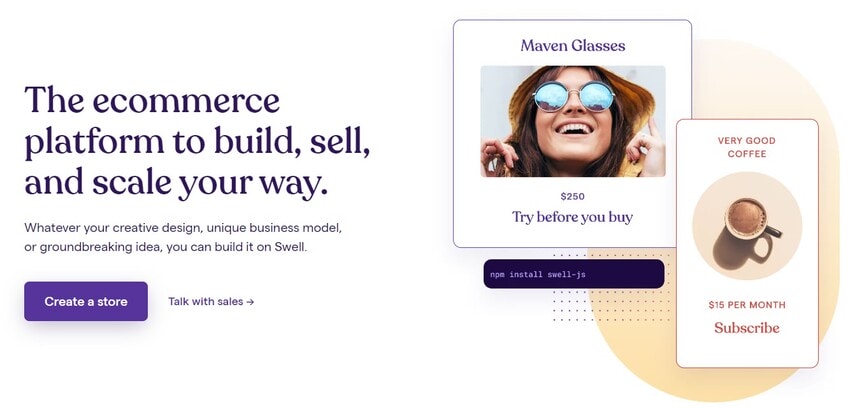
A rising headless commerce platform called Swell is committed to creating distinctive buying experiences without adopting dozens of different applications. Swell reduced all the complex and time-consuming activities associated with developing a creative and dynamic web shop. Its API-first strategy, headless architecture (which is arguably the best architecture for an eCommerce site), and robust commerce performance allow to create cutting-edge online stores without any coding from scratch.
Perhaps, Swell is the most user-friendly and intuitive of all the API-focused commerce systems on our list. It aims to assist companies who have physical locations and provide some kind of reviewable service. Among the healthcare, retail, service, and hospitality industries, there is a large number of Swell users.
Pros:
- An easy start as the platform is made for non-technical users
- A reasonable cost for this headless solution if compared to other headless commerce systems
- Ready-made themes for beautiful headless storefronts
- Create custom checkout flows using APIs
- Autoscaling servers and global CDN to ensure Swell’s scalability and flexibility
Cons:
- No multi-currency option on the platform’s roadmap
- API available only with the Enterprise plan
- Lack of instructions and documentation on challenging issues
- No multi-store support because Swell was designed primarily for small and mid-sized businesses
Fabric
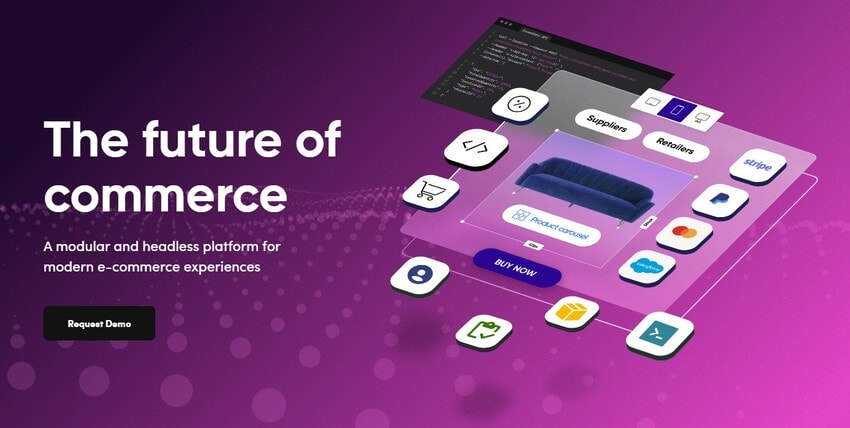
Fabric is a headless, modular platform designed for contemporary eCommerce operations. Thanks to an open and modular architecture, the technological solution makes websites and online stores go live without having to switch platforms for the needs of scaling or upgrading.
Businesses may personalize their eCommerce experiences like adding products to cart, adjusting shipments, verifying promotions, retrieving data in bulk, etc. by separating the front-end of sales channels from back-end systems using REST API. Managers have the ability to handle orders from several channels, monitor warehouse activities, and let clients divide payments across PayPal, gift and credit cards, and other paying systems.
Pros:
- Secured and scalable SaaS platform
- The API-centric approach makes Fabric’s headless architecture comply with GNC’s strategic omni-channel methodology
- Ability to reconfigure or restart an old eCommerce website without any disruptions
- Fabric often releases updates to fix bags and common issues
Cons:
- Unsuitable for slowly growing enterprises
- Not compatible with mobile deployment
- Insufficient reporting capabilities
Elastic Path
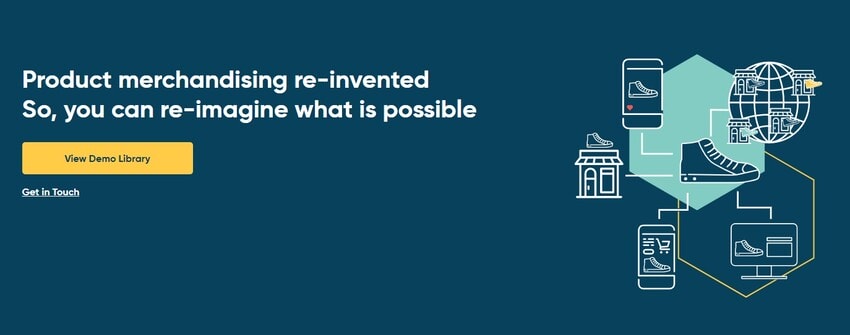
One of the best headless commerce platforms for enterprise businesses, Elastic Path offers several commerce solutions. With a full-fledged and ready-to-launch solution, this headless eCommerce platform seeks to eliminate all the complexities associated with going headless. It combines the robust capabilities of a traditional eCommerce platform with the agility of a headless architecture.
Compatible with Adobe Marketing Cloud, Elastic Path offers cutting-edge omnichannel eCommerce, multiple shopping carts across different devices, powerful merchandising, product search (including advanced filtering), dynamic pricing, customer support, etc.
Pros:
- Seamless integration with the existing front-end systems: CRM, ERP, POS, etc.
- PWA, AR experiences, Facebook chatbots, and Alexa skill references within the front-end technologies used
- Flexible deployment choices: private cloud or on-premise options
- Easy for non-Java programmers to understand and configure
Cons:
- The product management tool isn’t accessible over the web
- It takes much time to customize certain business solutions
- For newcomers to get started, the documentation and guidelines are not sufficiently thorough
OroCommerce
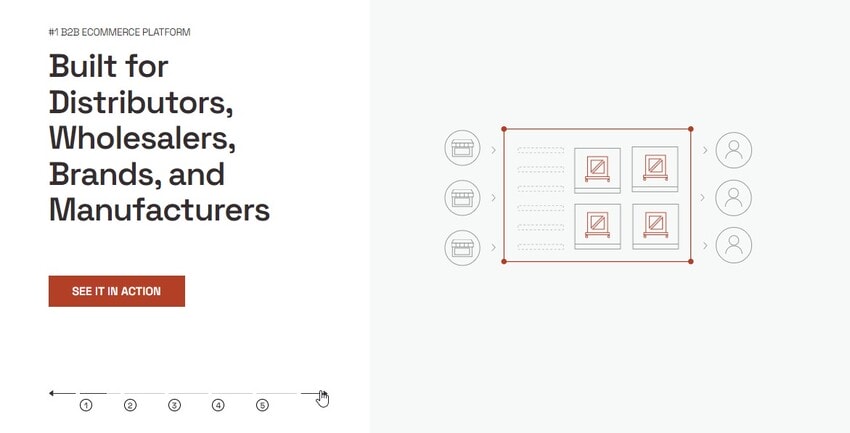
OroCommerce is an open-source eCommerce platform that was developed with B2B businesses in mind, although it can accommodate any business model, including B2B2B or B2C, thanks to its extensive out-of-the-box functionality.
Being an outstanding headless commerce example, the platform is available as an on-premise and SaaS/cloud-based solution, powered by both headless and monolith approaches. It works great if you need to combine a robust commerce back-end with front-end applications, like CRM or ERP.
Pros:
- Multi-store management from a single interface
- Strong B2B focus: corporate customer accounts, promotion management, custom catalogs, etc.
- B2B marketplace administration and self-service portals support
- Integration with EDI, PIM, ERP and other third-party systems
- An active community of almost 20,000 registered developers
Cons:
- Extensive coding experience is required
- Only a few add-on extensions are available along with the built-in functionality used for most operations
FoxyCart
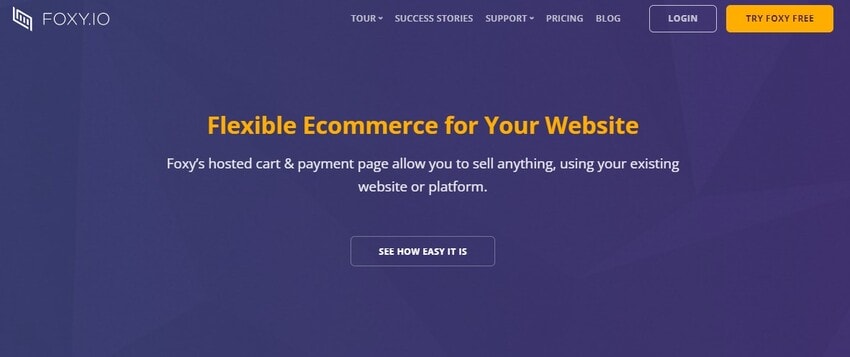
FoxyCart is a completely customisable eCommerce platform that allows web designers and developers to build robust yet user-friendly online shopping carts. Foxycart satisfies the requirements of experienced developers while also being appropriate for beginners with a working grasp of HTML.
Due to its versatility, the platform complies with various business models and can be called one of the best headless ecommerce. The CMS and marketing technologies of FoxyCart do not make it an all-in-one system, though. Instead, it was designed to give retailers the quickest checkout flow possible for a simple and speedy buying experience.
A few years ago, the company changed its name from FoxyCart to Foxy.io. With a stronger emphasis on their API and how it can be incorporated into platforms, it still functions the same.
Pros:
- Highly versatile and adaptable to make any changes to suit business needs
- Foxy.io provides utilizes Hypermedia API (hAPI). These add additional connection between resources & intelligent clients while yet being similar to REST
- A straightforward platform with a wide range of features, tools, and capabilities to create eCommerce core and manage it quickly and easily
- High-quality, PCI-compliant security
Cons:
- A per-transaction fee is unavoidable
- The developer documentation lacks detailed information, code solutions and examples
Shogun
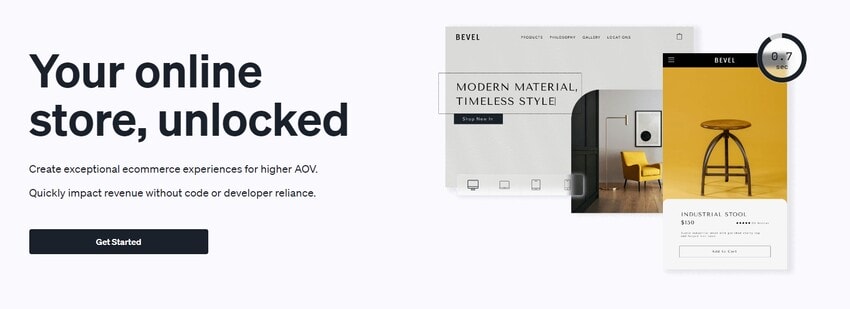
Shogun is a popular application on Shopify's platform. It is a drag-and-drop page builder and editor for Shopify merchants who want to personalize their stores without the assistance of a professional.
Any built-in Shopify theme is compatible with Shogun. It also has access to edit Shopify marketing pages: the homepage, FAQ, About Us, Contact, and Shopify Blog pages, as well as other landing and promotional pages.
In contrast to developing a custom eCommerce website, using such headless commerce software as Shogun Frontend provides all the advantages of a custom site along with even more adaptability and performance.
Pros:
- Split-testing for optimized pages
- Detailed analytics to assess the performance of pages
- The built-in scheduler for postponed publishing of content
- Full SEO controls to maximize the website’s visibility
Cons:
- Works only with Shopify, BigCommerce and Magneto
- Limited commerce tools if compared to other eCommerce platforms (especially enterprise-level)
Snipcart
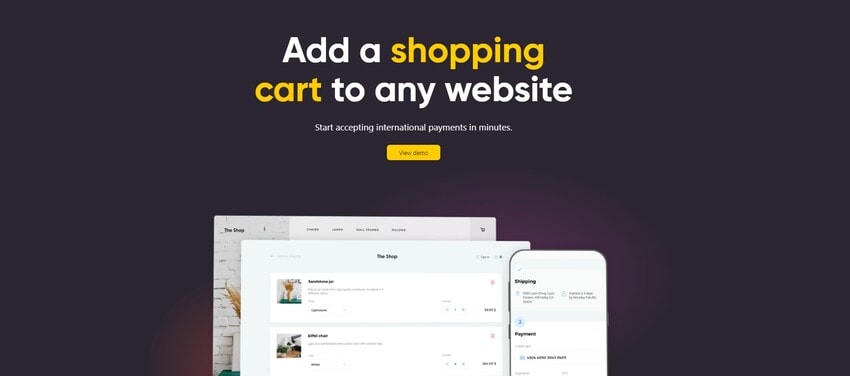
Using JavaScript and basic HTML, it is possible to incorporate the Snipcart shopping cart platform to any website. For managing eCommerce operations, it includes a comprehensive merchant back-end, webhooks & APIs, and a fully customized front-end shopping cart.
Snipcart is geared for real developers and designers rather than putting merchant demands first. You may use it to configure a unique eCommerce system, turning a regular website into a fully functional store. However, the process is relatively easy – all it takes is to copy and paste a script into the HTML code of your website, describe the specifics of your product there, and you're ready to go.
Pros:
- Separates the commerce back-end from the front-end to enable the use of any frontend/CMS stack
- Ability to add a shopping cart to any page with minimum effort
- Affordable to even small businesses that need an MVP shop
Cons:
- Limited functionality, basic out-of-the-box tools
- Monthly transactions fees
- No social commerce included
Nacelle
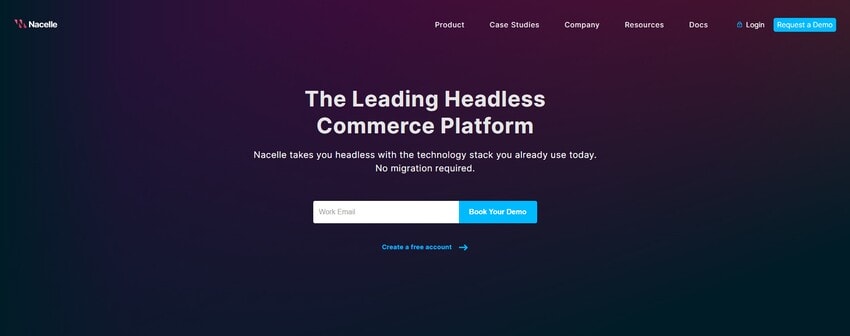
The Nacelle eCommerce technology reduces the time for going headless by streamlining, harmonizing, and optimizing scattered back-end systems. With Nacelle, businesses can quickly improve the performance of their websites: improve conversion rates, get quicker speed, higher GMVs, higher average order values, and reduce total cost of ownership.
For mid-market or enterprise-level merchandisers aiming to acquire a competitive edge or pursuing the headless journey, Nacelle is a great option. It is designed to help Shopify users get up and running as soon as possible. Additionally, users may simply combine this headless eCommerce platform with well-known CMSs like Sanity and Contentful.
Pros:
- Fast and modern PWA framework integrated with Shopify and Magento
- Cutting-edge commerce tools coming out-of-the-box
- Less complex back-end system
Cons:
- Relatively new and little-known platform among eCommerce merchants and developers
- Steep learning curve
Bottom line: which headless eCommerce is best?
If you are beyond the obvious question ‘what is headless eCommerce’ and consider your options, this article provides you with a wide selection of worthy candidates. Indeed, there is no easy answer when it comes to choosing a headless ecommerce platform. It depends on a variety of factors, including the type of business, the size of the operation, and the specific needs of the company. However, there is a perfect solution for any type of business.
The best headless ecommerce platforms offer a variety of benefits, including flexibility, scalability, and increased efficiency. They also provide businesses with the ability to create unique customer experiences. Some solutions are the finest at giving omnichannel experiences with a quicker API. Others are the ideal option for businesses who are expanding quickly and need a high level of security while handling large traffic. Still others work best for upgrading mobile apps and offering data visualization for medium- to large-sized enterprises.
With so many options available and headless commerce growth, it can be difficult to know which platform is right for your business. However, by doing your research and understanding your options, you can make a hands-down choice to combine the finest products available and create a composable architecture.